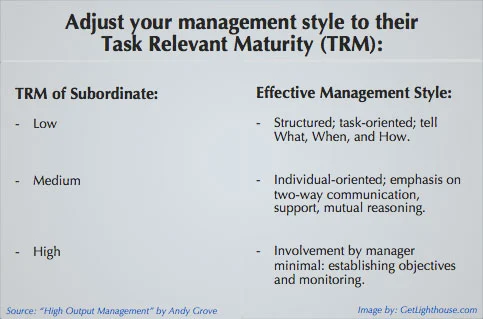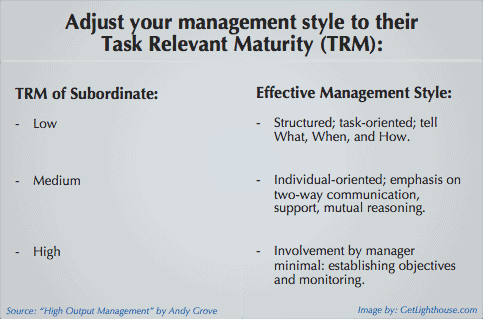Are your employees happy? Do you feel like they're performing at a level equal to their skills and potential?
Or do you find getting good work from them is like pulling teeth? Do some of them have one foot out the door (or, maybe, already left)?
We're all responsible for our own thoughts and attitudes, and the same goes for your employees. Yet, too often in the workplace, the conditions we create as managers make our employees unhappy, unmotivated, and ultimately crush morale.

5 Ways You're Contributing to Low Employee Morale
As a leader, it's important to recognize how you impact those around you. No matter where you are in the org chart, from first-level manager to CEO, your efforts and attitude impact your team.
Gallup calls this the "Cascade Effect" as they found engagement at one level impacts the morale of those below them in an organization:
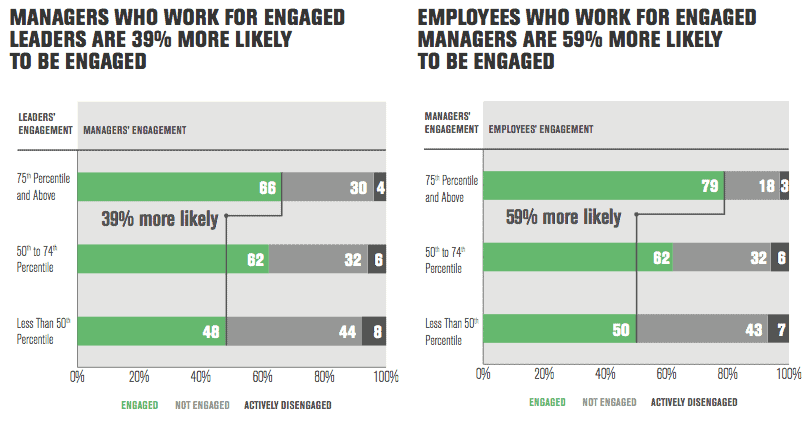
However, your attitude alone is not enough to make someone on your team engaged and performing at their highest level. To truly improve employee morale, you have to take action on the things that cause frustration and ruin a workplace.
Below are 5 common ways managers contribute to even the best employees being discouraged and disengaged:
- Not managing based on Task Relevant Maturity
- Having an Asshole on the team
- Giving your people only uninteresting work
- Ignoring what your team tries to tell you
- A lack of purpose

1) Not managing based on Task Relevant Maturity
Some managers are very hands off. They give their teams a wide berth and a lot of autonomy to do their jobs.
Other managers are very hands on. Some might even call them micro-managers when taken too far.
Both approaches are wrong.
Management is not one size fits all. Sometimes you need to be hands on. Other times, staying out of the way is the best thing you can do.
Enter: Task Relevant Maturity
Andy Grove, cofounder of Intel, coined the phrase Task Relevant Maturity in his management classic, High Output Management. Basically, it's taking the idea that you should be as hands on (or off) as needed, depending on the experience level of your employee for the specific task they currently have. This chart explains it best:
The problem managers run into is that they look at Task Relevant Maturity at the employee level instead of the task level.
When an employee is taking on a new task or responsibility, they want guidance and help. When they struggle at doing something and there's no help to be found, it's frustrating and discouraging.
Meanwhile, when they know what they're doing, and they're meeting or exceeding your expectations, the last thing they want is you telling them exactly how to do their work.
How to change:
Consider each person on your team and where the stand in Task Relevant Maturity for their core responsibilities. Adjust how hands on or off you are based on that.
Also, use your one on ones to ask where they want more help and guidance. They'll appreciate the support where they need it and the focus on outcomes over micromanagement where they're comfortable.
2) Having an Asshole on the team
Whether at your current job or a past one, there's probably the name of at least one person that comes to mind when you think of an asshole in the work place. Think about how toxic they made the work environment. I can feel the dread all over remembering moments throughout my career.
Leadership expert and best-selling author Robert Sutton has dedicated his life to the cause of getting rid of work place assholes. In his book The No Asshole Rule, he highlights a series of facts that show the true cost of having one on your team:
- People suffer physical & mentally: "Employees with abusive supervisors quit their jobs at accelerated rates, and those still trapped in their jobs suffered from less work and life satisfaction and productivity, trouble concentrating at work, and mental and physical health problems."
- Negative experiences linger: "Negative interactions had a five-fold stronger effect on mood than positive interactions."
- It causes more turnover than you think: Research in the UK showed "25% of bullied victims and 20% of witnesses quit their jobs."
Worse yet, they tend to spread:

Have the courage to get rid of them
Too often companies are afraid to get rid of assholes. Many times, they're some of the best performers and you then find yourself compromising on values to keep them. That's a big mistake.
There's now research that shows how much you're better off parting with even the most talented asshole. In a working paper from Harvard Business School, Michael Housman and Dylan Minor were able to calculate the hidden cost of assholes:
"In comparing the two costs, even if a firm could replace an average worker with one who performs in the top 1%; it would still be better off by replacing a toxic worker with an average worker by more than two-to-one."
This shouldn't be surprising. Given an asshole's toxic behavior negatively impacts the morale of everyone on the team, their productivity comes at the expense of others. When you add in the costs of replacing those that leave because of the asshole, costs quickly skyrocket before even considering all the lost time and energy from management trying to address the issue.
How to change:
Build a case to get rid of the asshole on your team. Watch how happy the rest of your team is when they're gone.
Use that to build momentum toward continuing to keep assholes out of your organization. No one should dread working with their colleagues, so don't let an asshole kill your employee morale.
Further reading:
3) Giving your people only uninteresting work
We all have work in our life and job that we do not enjoy doing. Often, these get done because somebody's gotta do it. The problem that can occur is when that's all people get to do.
When someone has nothing but boring, menial tasks, and feels unchallenged, they are likely to get bored and disengage. That's a waste of their potential and the resource you put into hiring and retaining talent.
A story: The selfish manager
In a friend's past job they worked with a small engineering team. The leader of the engineering team would divide up work for all of the engineers.
Unfortunately, the team leader was selfish and untrusting. Since they managed and had to be an individual contributor, they kept all the most interesting and challenging tasks for themselves; this kept them motivated in the work and ensured any tasks given to the other engineers didn't require a lot of effort to manage and mentor the engineers.
The byproduct of this was damaging on many fronts.
First, the engineers were all disengaged from their work as they never got to work on interesting tasks, instead feeling like all they got were "scraps." Meanwhile, when the leader left because of burnout from doing too much themselves, the team became much more engaged.
However, despite the increased motivation, they were set up to fail. They were involved in so little of their part of the product they then struggled to collectively fill his shoes and understand how to move the product forward.
If they had been more involved from the beginning, they could have prevented the leader's burnout as less would have been on their shoulders. They also likely would have gotten more done from a team of motivated people leveraging the multiplier mindset as described in this awesome video by Rent the Runway's CTO, Camille Fournier:
A better way: Do things together & help them grow
Rather than having anyone stuck doing only boring or menial tasks, look to do them together.
As it turns out, not only does this avoid disengaging anyone, but people will work longer and harder on tasks that are done together. Stanford researchers Priyanka Carr and Greg Walton found that when you simply told people you were working together on a task, the following happened:
"Participants in the psychologically together category worked 48% longer, solved more problems correctly, and had better recall for what they had seen. They also said that they felt less tired and depleted by the task. They also reported finding the puzzle more interesting when working together."
Next time there are to be done, do them together and watch how much better things go than putting it all on one person.
Grow your people, too.
One of the best, yet overlooked, ways to boost employee morale is to invest in their growth. Whether it's learning a new skill, or having a clear path to the promotion they want, even modest efforts by you as their manager can help significantly.
We wrote about this recently in reference to remote workers, and it holds true for your team members no matter where they're located. It applies to both old and young people on your team, and it's especially true for Millennials; according to Mary Meeker's Internet Trends, the top desire of Millennials at work is "training and development":
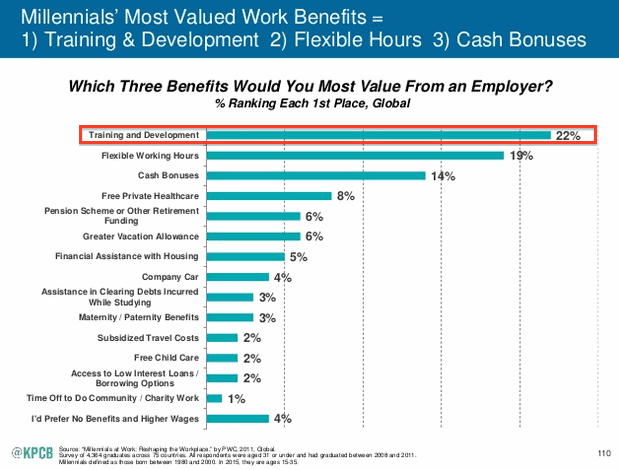
How to Change:
Take the time to learn what the growth and career goals are for people on your team (one on ones are a great time for that). Even giving them the slightest support, or even a small amount of their time to work on it can be a huge morale boost.
A few ways to do that can be: buying them a book or resource, introducing them to a mentor, or getting them involved in a project they're interested in.
If you need help with goals and growth conversations, these posts can help: How to talk with your team about their career goals & What to do if someone doesn't know what their goals are.

4) Ignoring what your team tries to tell you
One of the biggest risks as a manager is your team resenting you. It can happen for many reasons, and when it does, you're in trouble.
When they resent you, they'll start disengaging, be less responsive to you, may ignore your requests, and otherwise make things difficult for everyone.
One of the major causes of resentment is when you as a manager don't listen. Most people will trust their manager until they demonstrate a reason not to be trusted. Barring something particularly bad happening, it usually comes from either not demonstrating you're listening or failing to keep your promises to them.
The double-edged sword: the one on one
One on ones are the most powerful tool in your arsenal to keep your team happy and motivated. Done well, they're an outlet for a variety of problems, coaching, feedback, and career conversations. Done wrong, they can be merely status updates, wasted therapy sessions, talking in circles, and a moment of dread for everyone involved.
If you're talking about the right things in your one on ones, then the most important thing is to really listen. It's a key skill as a leader as Melanie Whelan described in a great interview in the New York Times.

Don't avoid tough issues. Don't be afraid to ask a variety questions. Give them more than 10 minutes and really dig into a problem so you fully understand it.
Want to organize your 1 on 1 information in one place? Download our free meeting template below.

Turn listening into action
And once you're listening, the key is to do something about it. Walk in their shoes for a second:
You finally work up the courage to bring up an issue to your manager. It's been driving you crazy for awhile, or maybe something happened that really upset you this week. Either way, it's finally out there and now you're optimistic things might get better with your manager's help.
Then the meeting ends.
And a week goes by. Then 2. Then a month. Nothing changes.
How would that make you feel? Are you going to bring up the next issue, or not bother?
When your team starts thinking that way you've lost. They will shut down and stop coming to you with problems. And that really is your job if you want to have an engaged team. The harsh truth is particularly visible in Gallup's research on engagement:
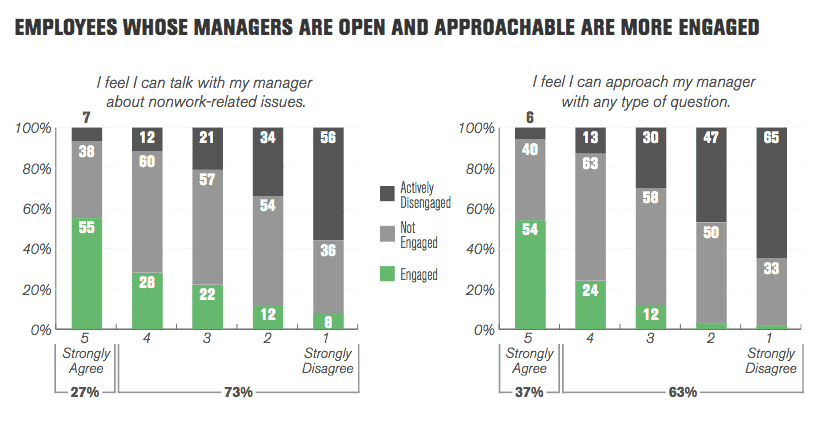
If you don't talk about the right things, really listen, and then take action on the discussion, it will all be for nothing. Your team won't trust you and keep coming to you. I don't think you want to bet on that sliver of green on the right chart above that doesn't even have room for the percentage that your team is engaged.
How to Change:
If you're not already having one on ones, then you need to start one on ones.
If you are, make sure you ask good questions in the meeting, and really listen. Then make sure you make progress on what you discuss. Even small wins can be tremendously powerful.
5) A lack of purpose
"My work doesn't matter."
"Why do I even bother?"
"No one cares."
If you have ever felt unappreciated or been stuck doing work that seems meaningless, you've probably said one of those statements to yourself. Right around that time, you probably found yourself either looking for another job or lowering the level of effort you put into your work.
Don't let your team feel that way.
Take the time to give feedback and let them know why their work matters and who notices. This isn't coddling, it's helping them feel valued.
A little praise goes a long way.
People want to feel appreciated and recognized for there work. Unfortunately, as we learned above about the asshole at work, "Negative interactions had a five-fold stronger effect on mood than positive interactions."
And it gets worse. In other research from Gallup, they found how much a lack of praise affected turnover:
"Employees who report that they're not adequately recognized at work are three times more likely to say they'll quit in the next year."
Or put more simply by the founder of Mary Kay Cosmetics:

Mary Kay Ash knows a thing or two about praise. The car she's leaning on is a special pink Cadillac that top performers in her organization receive. Their approach to praise has helped Mary Kay Cosmetics grow to over $2.9 billion in revenue.
Give people purpose
The bigger your company becomes, the less clear it is how someone's work matters. It's easy to feel like a cog in the machine. As a manager, you have the power to change that.
As we move to a world where more and more workers are doing creative and non-repetitive work, we have to rethink motivation. Research shows money is not the best motivator to get the best work out of your people in creative roles.
Dan Pink shares this in his TED talk, and his central thesis that to motivate people today, you need to focus on 3 things: autonomy, mastery, and purpose:
"Autonomy: the urge to direct our own lives.
Mastery: the desire to get better and better at something that matters.
Purpose: the yearning to do what we do in the service of something larger than ourselves."
When people feel like their work matters and understand how their contribution impacts a larger purpose, they're more motivated and engaged. It gives them the reason they need to do their best work.
Purpose + Praise = Winning Leadership.
Praise and purpose go hand in hand. You can give the best praise by tying it to a greater purpose:
"I loved your attention to detail on that report, Malena. It really shined when we presented it to the client. It was a critical part of closing them and they're one of our biggest customers."
"Thanks for coming in so early to help hot fix that bug, Stas. It would have affected a lot of our customers and it was starting to crush our customer success team. Fixing it so quickly saved the success team a lot of time and really impressed some of our bigger customers who don't move that fast."
The best praise is specific. In both of the examples above, the praise recognizes exactly what you liked about what your team member did, and it shares exactly why what they did mattered in the big picture of your company.
If you give that kind of praise, there's a good chance they'll put in the same effort next time you need it.
How to Change:
Take a look at the work your team is currently doing. Have you explained to them why it matters? How will it impact customers? How will it help coworkers do their jobs better?
Take a few minutes to talk to them and find something you really like in their work and specifically praise them. If you're looking for more advice on giving awesome praise, this post can help.
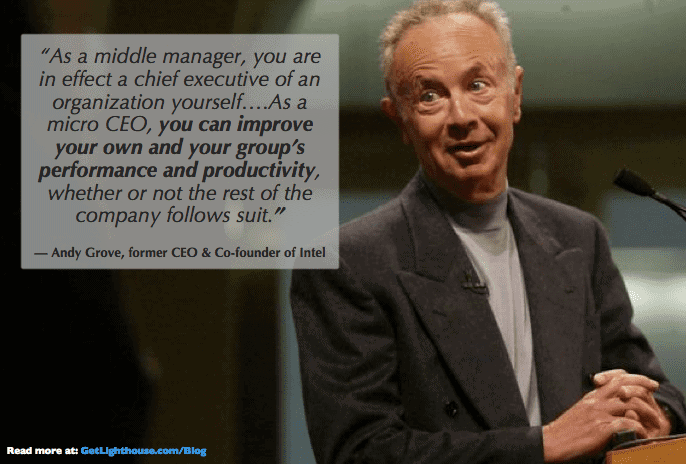
Who is responsible for employee morale? It's up to you as a manager to make an impact on it
When you see people on your team under-performing or showing low morale, it's easy to look at them and place the blame on them for a bad attitude. Maybe they are a B or C player.
However, it's just as likely that they're not being managed well or that circumstances around them have created an environment that crushes morale.
If you're honest with yourself and take a hard look in the mirror, there's a good chance you'll find some things you may be doing (or failing to do) to contribute to the problem.
Try one of these five areas we've discussed today and you may be surprised how you can impact employee morale with your actions.
More resources on low morale in the workplace and other key leadership topics
If you'd like to learn more about improving morale and better motivating your team, take a look at these posts:
Tips on keeping your team motivated:
- How to Keep Your Team Engaged When You Have Low Morale at Work
- How the Elephant and the Rider can help motivate your team
- How to Give Constructive Feedback to Motivate & Improve Your Team
- Bad Management's 7 Deadly Sins and what to do instead
On keeping your team and yourself motivated in a crisis:
- Crisis Leadership: 18 Questions to Ask Your Team in a Crisis
- Leading Happy Teams: 5 Ways to Keep Your Team Happy in a Recession
- Workplace Stress: 8 Ways to Reduce Stress in the Workplace Today
And on starting regular 1 on 1 meetings:
- Why Your One on One Needs a Meeting Agenda (+ making them great)
- 30 One on One Meeting Tips for Effective One on Ones
- One on One Meetings: The Only Guide Managers Need [Free Template
- Our podcast episode on great 1 on 1s from a variety of seasoned managers:

How do you motivate employees with low morale?

As a manager, you have a huge influence on motivating employees with low morale.
There are many reasons why your employees might be unmotivated, so fixing the situation all depends on what the problem is:
- If there's a problem employee on the team that is consistently bringing the entire team down, you need to address the issue at the root and get rid of the bad apple.
- If they're not feeling a sense of excitement, it might be because none of the work they're doing aligns with their professional development goals. To reinvigorate them, make sure a portion of what they work on gives them a sense of personal and professional progress.
- You can't know what the issue is unless you're listening and paying attention to them. So, start having regular 1 on 1s with your employees, ask questions, and listen carefully for potential problems.
- If you're giving people work based on their past performance, you're not applying the concept of Task Relevant Maturity and you're assuming they'll do great in their new role when they don't have the skills to thrive in it. Task relevant maturity teaches leaders to be more hands-on if people are doing something for the first time and giving them more autonomy as they get better at it.
- If you're giving people tedious work only, stop. When someone has nothing but boring, menial tasks, and feels unchallenged, they are likely to get bored and disengage. That wastes their potential and the resource you put into hiring and retaining talent.
For more ideas on how to improve low morale at work, read: How to Keep Your Team Engaged When You Have Low Morale at Work.
What are the consequences of low morale?

Low morale can cause all kinds of consequences such as:
- Lower productivity and engagement
- Poor communication
- Increased turnover
- Decreased quality and output of work
Plus, morale is contagious. If one employee loses morale, his or her teammates will feed off of that and dampen their own morale.
Read more about how you might be causing low team morale: How you're causing low employee morale at your company.
How do you fix low morale?

Fixing low morale requires you to know what's causing the morale issue in the first place. If you aren't already having them, start having regular 1 on 1 meetings with your team members.
Ask good questions, then simply listen. Show them that time with you is a place where they can feel comfortable opening up about any issues they're having.
Once they've opened up, chances are your morale issues probably have to do with one of these things:
- Being too hands off, or micromanaging in a frustrating way
- A bad apple or a**hole on the team that is bringing team morale down
- Lack of personal growth and interesting work
Read more about how you might be causing low team morale: How you're causing low employee morale at your company.
What are the causes of low morale?

There are many causes of low morale in the workplace, including:
- Not enough opportunities for people to do meaningful work that makes them feel like they're progressing in their professional goals
- You're not assigning work to your team based on their skills but rather based on their previous merit, causing them problems in their new roles (i.e. you're not using task-relevant maturity to determine how hands-on you need to be with their work)
- There's someone on the team who is sapping motivation because of their toxic behavior and you're not doing anything to address that
- You don't listen to your team's feedback and react to it on time
It's impossible to find out what the problem is if you're not communicating with them on a regular basis. The only way to find out is by creating opportunities to get them to open up to you.
For that to happen, make sure you're having regular 1 on 1 meetings with each team member. Get started with 1 on 1s using our 1:1 meeting template.
Or read more about how you might be causing low team morale: How you're causing low employee morale at your company.
